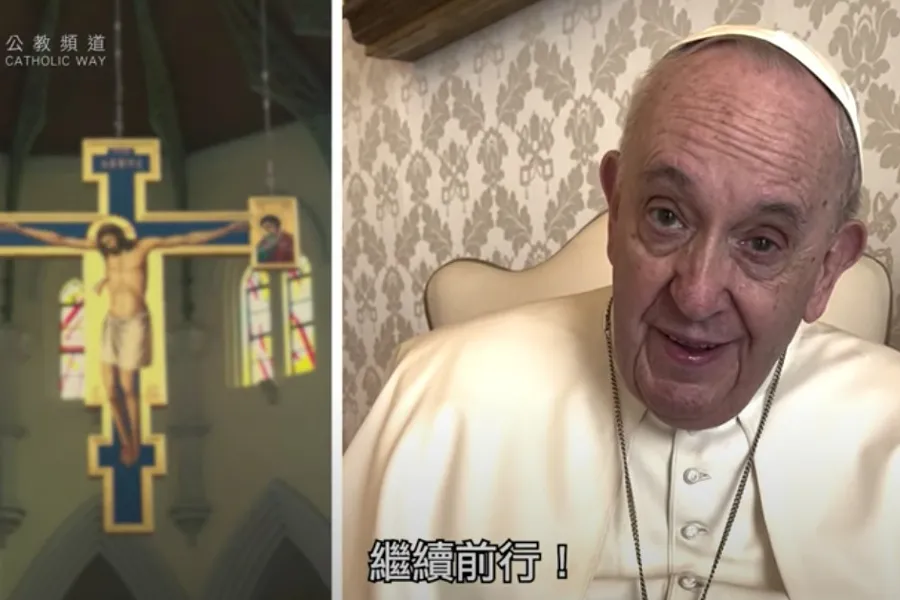
Rome Newsroom, Mar 23, 2022 / 09:22 am (CNA).
Pope Francis has recorded video messages for Catholics in Hong Kong and in mainland China.
The two videos were recorded during the pope’s meeting with Bishop Stephen Chow Sau-yan last week, according to the Catholic Diocese of Hong Kong.
During the March 17 meeting, Bishop Chow suggested that the pope give his blessing to the Church in China and Hong Kong, which are both facing serious COVID-19 outbreaks this month.
Pope Francis then recorded the videos with a brief message in Italian before giving his blessing.
The videos, which were posted online with Chinese subtitles, have been viewed thousands of times, less than 24 hours after the Diocese of Hong Kong released them on March 22.
“Thank you for your witness of faith. Thank you for the love of the Lord Jesus Christ and the Holy Mother of God, Our Lady,” Pope Francis told Catholics in China.
“Let us move forward with the Lord. The Lord is sometimes hidden from our sight, but he is always beside us. It takes patience to hope. I am close to you, I love you so much. I pray for you and you, please, pray for me,” the pope said.
Pope Francis also commended Chinese Catholics for enduring suffering with strength during the COVID-19 pandemic.
In his message to Catholics in Hong Kong, posted on YouTube with subtitles in traditional Chinese characters, the pope expressed his closeness and encouraged the faithful to be courageous.
“I wish you to be good citizens and that you are courageous in the face of the challenges of time,” Pope Francis told Hong Kong Catholics.

At the beginning of the video, Pope Francis also said: “I am here with your bishop. I send you my blessing; I wish you all the best.”
This was the first time that Pope Francis has addressed Hong Kong Catholics directly since media outlets reported that the pope dropped a reference to Hong Kong from a Sunday Angelus message in July 2020.
The omission occurred a few months before the Vatican announced its decision in October 2020 to renew the Holy See’s two-year provisional agreement with Chinese authorities on the appointment of bishops in China.
The renewed provisional agreement between the Holy See and China is due to expire in the fall of this year.
Since the Holy See first entered into an agreement with Chinese authorities in September 2018, Chinese government-approved Catholic churches have faced pressure from the government to censor parts of Catholic teaching, while including Chinese nationalism and love for the party in preaching.
Catholic priests who minister in China are only legally allowed to minister in recognized places of worship in which minors under the age of 18 are not allowed to enter.
For the underground Catholic community, life has been “very harsh,” according to Fr. Bernardo Cervellera, missionary priest and journalist who closely covered the Church in China for more than two decades.
“We have seen some convents of sisters destroyed, churches closed. We have seen priests chased from their parishes and also some seminarians forbidden to study theology … and also bishops who are arrested or in whole house arrest, 24 hours a day,” Cervellera told CNA last year.
The meeting between Pope Francis and Bishop Chow was the first time that the two had met at the Vatican since Chow’s consecration as a bishop in Hong Kong’s Cathedral of Immaculate Conception in December.
Hong Kong has faced a steep rise in the number of COVID-19 infections and deaths since February. There have been more than 5,600 deaths recorded in this latest wave of the pandemic, according to a report from The Washington Post on March 21.
Mainland China has likewise been hit hard by rising coronavirus cases in 2022 with the government placing 37 million people under lockdown last week.
“Thank you for your work and thank you for enduring with such strength this COVID pandemic that makes us suffer so much,” Pope Francis told Chinese Catholics.
If you value the news and views Catholic World Report provides, please consider donating to support our efforts. Your contribution will help us continue to make CWR available to all readers worldwide for free, without a subscription. Thank you for your generosity!
Click here for more information on donating to CWR. Click here to sign up for our newsletter.





All the best!